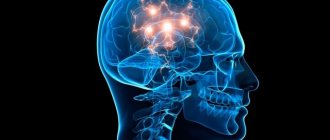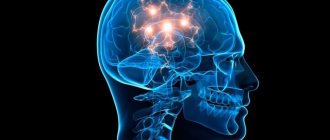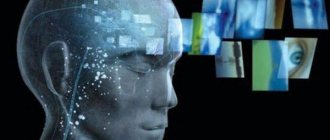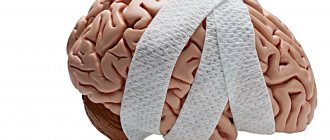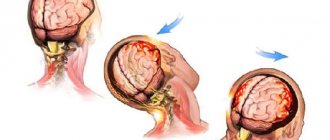When youth passes, people are left with a memory as a consolation, carefully preserving all the sorrows, joys, successes and achievements they have experienced. Alzheimer's disease and other types of dementia rob a person of more than memories - they literally rob him of everything that makes up life itself. To prevent the threat, we must try to do everything in our power.
Of course, forgetfulness with age is a natural thing. And not always, when memory weakens, you need to panic and suspect the worst. Indeed, according to statistics, for every person with Alzheimer's disease, there are 8 older people suffering from ordinary age-related decline in memory and intelligence.
The diagnosis is presumptive
It's not just Alzheimer's disease that can rob a person of memory and mental capabilities. “More than 30 other reasons can cause the development of dementia in old age. For example, vascular dementia is the cause of a third of such cases,” says Professor, Head of the Department of Geriatric Psychiatry, leading Russian specialist in the field of mental disorders of elderly and senile age, Doctor of Medical Sciences Svetlana Gavrilova. — Vascular dementia can occur both after major strokes and after repeated hypertensive crises and cerebrovascular accidents that were left without proper treatment. Weakened memory and decreased cognitive potential can also be caused by other causes: tumors, head injuries, intoxication, brain infections, metabolic disorders and even depression.”
In addition, as the expert said, doctors still do not have reliable non-invasive methods to accurately diagnose Alzheimer's disease. Therefore, during the patient’s lifetime, such a diagnosis is made on the basis of clinical symptoms and a whole range of studies, including by identifying biomarkers of Alzheimer’s disease in the cerebrospinal fluid.
Among hardware studies, CT and MRI of the brain are used, and neuropsychological testing allows for a detailed examination of intact and impaired cognitive functions. As part of a neuropsychological examination, the patient must remember a number of words, numbers, geometric figures, read, count, repeat a complex phrase, draw a clock with a given time, copy a geometric figure. However, these studies do not have absolute diagnostic significance.
Be in line. Will late retirement help prevent dementia? Read more
Signs of vascular dementia
Vascular dementia in older people and in young patients proceeds in approximately the same way. In the first stages, there are no pronounced symptoms, although destructive processes in the brain are already occurring. The moment when a person and his loved ones may notice signs of the disease depends on the cause of the disorders and the general condition of the patient. On average it takes from 1 to 6 months. Symptoms indicate health problems:
- Memory and the ability to perceive information gradually deteriorate. The patient may forget about entire episodes of his own life.
- The mental state changes. For example, the patient may become depressed, behave aggressively, or cry or laugh involuntarily. Attacks of apathy are repeated when a person does not want to do anything for no apparent reason.
- Social activity decreases. It becomes difficult for a person to perform familiar and simple actions: he gets lost in a store, does not know how to use an ATM, etc.
- The circle of interests narrows: a person becomes indifferent to what previously seemed interesting and important to him.
- Written and oral skills decline. Patients do not always understand the meaning of phrases spoken to them, especially long ones, and in conversation they confuse letters and words. Talkativeness may develop and increase, but the speech itself is incoherent, and the patient usually does not understand the meaning of the phrases he utters.
- The patient's gait changes: it becomes shaky, constrained, and unstable. Tremor and muscle hypertonicity are possible.
- The ability to care for oneself decreases. At the beginning, we are talking about everyday actions, for example, a person cannot cook or heat food. But in later stages, the patient can no longer independently control his physiological needs.
In no case should you independently diagnose yourself or your loved ones, even on the basis of a large number of symptoms, since this can only be done by a doctor after an examination, examination of the brain (EEG, CT, MRI), ultrasound examination of the great vessels, etc. It is important to distinguish the disease from other types of mental disorders, assess the stage of dementia and select an adequate rehabilitation program.
Plague of the 21st century
More than a hundred years ago, the German psychiatrist Alois Alzheimer described a disease that people knew about before, although they did not consider it a pathology, believing that it was quite natural to not be friends with your head in old age. It turned out that dementia (dementia), which develops with Alzheimer's disease and other diseases, is not at all the norm. In addition, as it turned out, not only old people suffer from dementia.
The threat of memory loss and a decline in the mental potential of humanity could soon reach epidemic proportions. From 2010 to 2015 alone, statistics on dementia increased by 10 million cases. And scientists estimate that by the middle of this century there will be more than 130 million elderly people with dementia in the world. Moreover, if earlier this problem concerned mainly the population of high-income countries, today the frequency of the disease is growing like an avalanche in countries with middle and low incomes.
Dementia, or acquired dementia
Borreliosis
Syphilis
Atherosclerosis
Diabetes
Stroke
3816 April 15
IMPORTANT!
The information in this section cannot be used for self-diagnosis and self-treatment.
In case of pain or other exacerbation of the disease, diagnostic tests should be prescribed only by the attending physician. To make a diagnosis and properly prescribe treatment, you should contact your doctor. Dementia: causes, symptoms, diagnosis and treatment methods.
Definition
Dementia is a neuropsychiatric syndrome based on acquired, long-term (more than 6 months), progressive impairment of the cognitive functions of the brain - thinking, attention, memory, speech, perception of the surrounding reality, purposeful motor activity, orientation in space, recognition of time and places.
A significant decrease in cognitive functions leads to a deterioration in a person’s social, everyday and professional adaptation.
According to statistics, there are about 47 million people with dementia in the world, and by 2050 this number is predicted to increase significantly. Dementia is most common in low- and middle-income countries, where about two-thirds of people with this disorder live.
Causes of dementia
Dementia is most often diagnosed in people over 65 years of age. This syndrome can accompany many diseases and conditions: for example, dementia develops with Alzheimer's disease (AD) - 50-75% of cases, with vascular lesions of the brain - 20%, 5% each for dementia with Lewy bodies and frontotemporal dementia . In 10-15% of all cases, the patient’s dementia is caused by a combination of Alzheimer’s disease and vascular brain damage. The development of the syndrome can be caused by metabolic disorders, traumatic brain injuries, tumors of the brain and its membranes, brain metastases, autoimmune diseases (multiple sclerosis) and neuroinfections (neurosyphilis, neuroborreliosis, etc.).
Identifying the causes of dementia is important for choosing therapy that can slow down the progression of the disease, and in some cases even reverse the development of disorders.
Dementia in Alzheimer's disease
. Alzheimer's disease is a chronic neurodegenerative disease, the mechanism of development of which is not fully understood. Doctors believe that the disease occurs as a result of a combination of several factors, with genetic defects playing a leading role. Up to 10% of all cases of AD occur in familial forms, when pathological genes are inherited. There are currently three known pathological genes that can cause AD. One of the key links is a violation of the metabolism of the amyloid precursor protein. Normally, this protein is broken down into fragments that are not dangerous to the body. In AD, this process “breaks down”, and the fragments combine into the pathological protein β-amyloid, which is deposited in the brain substance and the walls of blood vessels, which leads to damage and death of brain cells.
Risk factors for the development of asthma are divided into correctable and non-correctable (those that cannot be influenced). In addition to genetic factors, uncorrectable factors include age, female gender, previous traumatic brain injuries, depression, lack of higher education, and low intellectual activity throughout life.
Correctable factors are arterial hypertension, atherosclerosis of large vessels of the head and neck, obesity, high cholesterol, high homocysteine, diabetes, and a sedentary lifestyle.
Dementia due to cerebrovascular diseases (vascular dementia). Vascular dementia can be caused by a stroke or chronic cerebral ischemia. The main risk factors are arterial hypertension, atherosclerosis, coronary heart disease, cardiac arrhythmias, diabetes mellitus, smoking, obesity, high cholesterol, high homocysteine levels, and less commonly, rheumatic vascular lesions, pathologies of the blood coagulation or anticoagulation system, and congenital vascular anomalies.
Classification of the disease
There are three main degrees of severity of dementia – mild, moderate and severe. Sometimes a preclinical stage is distinguished, when initial signs of an intellectual-mnestic disorder are noted - constant mild forgetfulness, difficulties in determining temporary relationships, while social and professional activity is preserved or slightly hampered, and everyday activity is not impaired.
At the stage of mild dementia, memory impairment (especially for current events) intensifies and becomes obvious to others, and difficulties arise in chronological and geographical orientation. Abstract thinking, the ability to generalize and compare suffers. Oral speech becomes poor, and written speech contains a large number of errors. Professional activities and social activity are limited, but still possible; patients cannot travel independently or resolve financial issues, but they retain independence in everyday life, can take care of themselves and live separately.
The stage of moderate dementia is characterized by severe memory impairment, making it difficult to acquire knowledge and remember current events, as well as reproduce past experiences and knowledge. Orientation in time and surroundings is severely impaired. The ability to read and write is lost, oral speech is difficult to understand. It is difficult for patients to use household appliances, carry out hygiene procedures, dress, and prepare food. Typically, at this stage of dementia, people can no longer live independently, but they can still be left alone for some time.
The severe stage is characterized by a complete loss of the possibility of independent existence and the formation of absolute dependence on others.
Patients lose awareness of time and surroundings, the ability to judge, make inferences and verbal communication.
Diagnosis of dementia
First of all, it is necessary to exclude a number of conditions that can either be an independent cause of cognitive disorders or contribute to their aggravation. Among them are anemia of various origins, hematological malignancies, infectious diseases, renal and liver failure, electrolyte disturbances, including those associated with taking medications, in particular hyponatremia, thyroid dysfunction, etc.
For this reason, differential diagnosis includes the following studies:
- general blood analysis;
Not simple forgetfulness
“As a rule, the course of the disease from the moment obvious symptoms appear is quite rapid. Although the latent period, during which asymptomatic death of brain neurons occurs, can last a long time, for 20 years, warns Doctor of Medical Sciences Svetlana Gavrilova . “But it is at this very early stage that treatment is more effective. “Alas, after the manifestation of symptoms, the average life expectancy of patients is approximately 8-10 years.”
Dementia begins quite harmlessly, with banal forgetfulness, which is almost always perceived by others calmly and even with humor. Well, whatever you want, old age is not a joy. Further - more: patients experience depression, irritability, aggression. Personality changes are very characteristic: a person was kind, generous and intelligent, but suddenly became rude, suspicious, stingy, angry and stubborn. However, all this is also sometimes attributed to senile grumbling and bad character.
Article on the topic
Dentist instead of neurologist. How can dental care protect against dementia?
No criticism
The first suspicions arise when the patient develops speech disorders (for example, slowing down) and difficulties finding words, as well as problems with orientation in unfamiliar areas. But, as a rule, people go to the doctor (or more often their relatives bring them) only when forgetfulness appears too obvious. In particular, there are lapses in memory (especially regarding recent events and names) and disorientation in time and space. For example, a person cannot remember what was discussed just five minutes ago; he tells or asks the same thing. Or he may be puzzled by the question of what date and year it is. Such a person is capable of getting lost in his own yard or even in his apartment. By the way, an important point: at the same time, patients lack self-criticism. They do not notice any oddities in themselves, believing that everything is fine with them. And suggestions from relatives to go to a neurologist, and even more so to a psychiatrist, are perceived with resentment.
But if the progression of the disease is not slowed down with treatment, people quickly cease to recognize even those closest to them, understand speech, and then even forget about who they are, losing all skills and the ability to self-care. They begin to suffer from hallucinations, delusional ideas (most often they begin to suspect others of stealing or causing damage), constant anxiety and motor agitation arise. Then - only “vegetative” existence and death.
Stay sane. Can Alzheimer's disease be prevented? More details
What to watch out for
As Svetlana Gavrilova said, in addition to hereditary predisposition (in 10-15% of patients), the development of dementia can be facilitated by:
- low mental and physical activity;
- depression and chronic stress;
- head injuries;
- thyroid diseases;
- high cholesterol;
- arterial hypertension;
- diabetes;
- smoking, alcohol abuse;
- obesity, unhealthy diet;
- insomnia (sleep apnea).
By improving your lifestyle and starting to control all of the listed diseases, you can reduce the risk of senile dementia. There is an assumption that Alzheimer's disease develops more often and is more severe in people with a low level of education, since educated people have stronger connections between neurons in the brain, and if some brain cells die, their functions are taken up by other cells. Therefore, intellectual work, curiosity and daily learning of everything new is the best prevention of senile dementia. It is useful to learn foreign languages, memorize poetry and prose, comprehend new things, solve puzzles and crosswords, and understand computer programs. It is also necessary to develop fine motor skills - this also contributes to brain development and strengthening neural connections. Therefore, knitting, modeling, drawing and even just rewriting text by hand will be very useful.
Article on the topic
Dementia or forgetfulness? How to distinguish memory problems from illness
What is Alzheimer's disease and dementia
Dementia (dementia) is one of the symptoms of various diseases, which shows that the functioning of the cerebral cortex is severely impaired. Alzheimer's disease is an independent disease that leads to the destruction of neurons.
In the first years, Alzheimer's disease is asymptomatic, which makes timely diagnosis difficult.
Then, as pathological changes increase, symptoms of dementia appear:
• memory problems – small at first (a person forgets unimportant events, dates), then more global;
• deterioration in the effectiveness of actions - a person does not perceive new information well, even if it is very simple;
• decreased level of intelligence – the patient can no longer build cause-and-effect relationships or think logically;
• the sense of place and time is impaired, the ability to navigate in space deteriorates;
• sudden changes in mood – the patient becomes irritable, sometimes aggressive;
• the craving for activities that previously brought pleasure disappears, especially if these activities are related to fine motor skills or intellectual work;
• the personality and character of a person changes - some traits become hypertrophied (for example, a greedy person turns into a stingy one).
All these changes usually occur in old age and progress gradually. Several decades may pass from the onset of the disease to its terminal stage.


